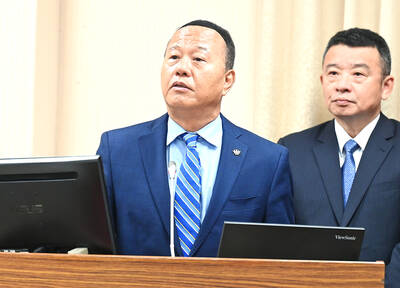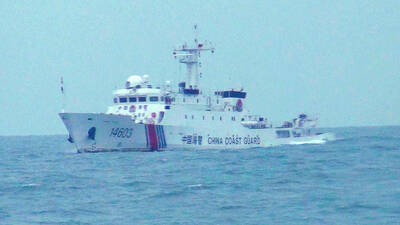The attempted assassination of late president Chiang Ching-kuo (
Chen has published his research on the incident, in which 32-year-old Taiwanese Cornell University student Peter Ng (
Chen was one of the panelists invited to speak at an Academic Historica forum in Taipei entitled "Post-World War II Dossier and History Study."
Ng, who also attended the forum, said the assassination attempt was planned by four people: himself, his sister, his brother-in-law, former secretary-general of World United Formosans for Independence (WUFI) T.T. Deh (鄭自財), and WUFI member Lai Wen-hsiung (賴文雄).
Ng raised his gun and was preparing to shoot Chiang, who was in the US to meet US president Richard Nixon in his capacity as vice premier, but a member of Chiang's US security detail struck him on the elbow, causing him to miss his mark.
Ng was wrestled to the ground and immediately arrested, along with Deh, who came to Ng's aid when he heard the shot go off.
Asked whether WUFI had backed away from the assassination attempt, Ng said: "Although there was some discussion of the assassination attempt within WUFI, [the organization] didn't come up with a concrete plan. We also wanted to protect the organization."
A guest at the forum suggested that WUFI had abandoned the assassination idea because Democratic Progressive Party Legislator Chai Trong-rong (蔡同榮), then chairman of WUFI, was against it.
Chen said the assassination attempt had initially boosted morale among independence activists. However, he said the decision by Ng and Deh to skip bail, coupled with WUFI's mishandling of the incident, had a disruptive effect on the pro-independence camp.
Ng said in his own book that he had never considered the possibility of serving time in the US. He argued that there was no reason for him to comply with the laws of the US government, which had helped consolidate the Chiang regime.
In Chen's book, Ng was quoted as saying the assassination attempt was intended to build connections between Taiwanese independence activists and international social movements in exile.
Other topics discussed during the forum included the former Chinese Nationalist Party (KMT) regime's crackdown on democracy advocates.
This was the subject of a presentation given by Lin Chi-yang (
He cited Lei Chen (
This demonstrated the KMT regime's willingness to exhaust all efforts to perpetuate its existence, Lin said.

VIGILANCE: The military is paying close attention to actions that might damage peace and stability in the region, the deputy minister of national defense said The People’s Republic of China (PRC) might consider initiating a hack on Taiwanese networks on May 20, the day of the inauguration ceremony of president-elect William Lai (賴清德), sources familiar with cross-strait issues said. While US Secretary of State Anthony Blinken’s statement of the US expectation “that all sides will conduct themselves with restraint and prudence in the period ahead” would prevent military actions by China, Beijing could still try to sabotage Taiwan’s inauguration ceremony, the source said. China might gain access to the video screens outside of the Presidential Office Building and display embarrassing messages from Beijing, such as congratulating Lai

Four China Coast Guard ships briefly sailed through prohibited waters near Kinmen County, Taipei said, urging Beijing to stop actions that endanger navigation safety. The Chinese ships entered waters south of Kinmen, 5km from the Chinese city of Xiamen, at about 3:30pm on Monday, the Coast Guard Administration said in a statement later the same day. The ships “sailed out of our prohibited and restricted waters” about an hour later, the agency said, urging Beijing to immediately stop “behavior that endangers navigation safety.” Ministry of National Defense spokesman Sun Li-fang (孫立方) yesterday told reporters that Taiwan would boost support to the Coast Guard

GLOBAL: The slogan would be advertised in popular tourist destinations in North America and Europe, such as Champs-Elysees and Times Square, the agency said “Taiwan: Waves of Wonder” is to be the country’s new tourism slogan for the next 10 years, the Tourism Administration said yesterday, adding that it would be showcased in commercials at the Olympic Games in Paris and other major cities and travel fairs around the world. The new slogan, logo and theme song, which were unveiled at a news conference in Taipei, marked the agency’s latest effort to attract 10 million international visitors to Taiwan this year, a goal that it readjusted earlier this year, as China has yet to lift its travel ban to Taiwan. The administration created the “Taiwan: Touch

BOOST TO SPORTS? The Executive Yuan said that the amendment was introduced to attract professionals to Taiwan, and increase the incentives for naturalization The Legislative Yuan yesterday passed on third reading an amendment to the Nationality Act (國籍法) that would reduce the minimum residency period required for highly skilled professionals to apply for naturalization from three to two continuous years, with a minimum of 183 days in Taiwan each year. The 183-day requirement does not apply if an eligible applicant has lived legally in the territory of the Republic of China for more than five continuous years. Taiwan’s professional basketball leagues are expected to benefit from the amendments, which would allow them to recruit more players from overseas. Prior to the passage of the amendment, the